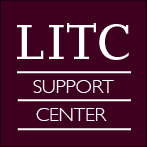The LITC Support Center’s mission is to increase awareness of and access to taxpayer rights by strengthening and supporting tax clinics that provide pro bono representation to low-income and other underrepresented taxpayers.
The Support Center provides technical support and training for clinicians and clinic volunteers; connects volunteers with clinics through LITC Connect; and advocates for systemic change through workshops, high-impact litigation, amicus briefs, research, and other projects.
You can learn more about the work of the LITC Support Center here.

